Omer and Omar: How two 4-year-olds were killed and social media denied it
- Published
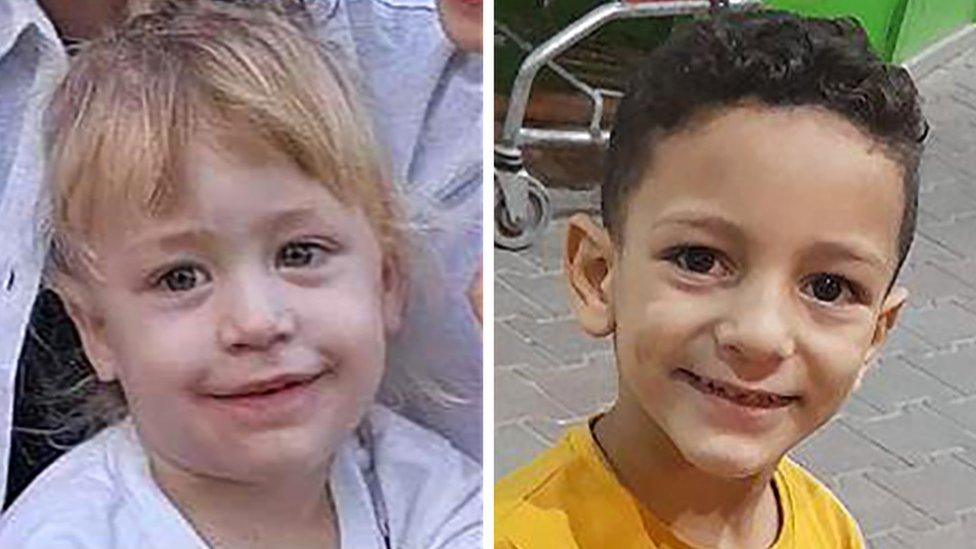
Omer Siman-Tov and Omar Bilal al-Banna were both killed in the Israel-Gaza war
In the opening days of the Israel-Gaza war two small boys, both aged four, were killed. One was Israeli, one Palestinian. But many posts I saw on social media weren't mourning their deaths - instead, they were trying to deny the killings had taken place.
Omar Bilal al-Banna and Omer Siman-Tov lived roughly 23km (14.3 miles) apart, on either side of the Israel-Gaza perimeter fence. They never met, but both loved playing outside with their siblings.
The faces of these little boys have appeared on my social media feed in the past week. They were both killed as violence unfolded.
I've tracked down family, friends and witnesses. In both cases they tell a tragic story.
Omer Siman-Tov was killed when Hamas attacked his home in Kibbutz Nir Oz on 7 October.
Omar Bilal al-Banna was killed four days later, following an Israeli airstrike on Zeitoun, east of Gaza City.
The way the boys' deaths have been denied by social media users is symbolic of an information battle, running in parallel with the war on the ground.
There have been brazen attempts to downplay or deny violence committed against children.
These false allegations have shocked family and friends grieving the loss of their loved ones - and the people who witnessed what happened.
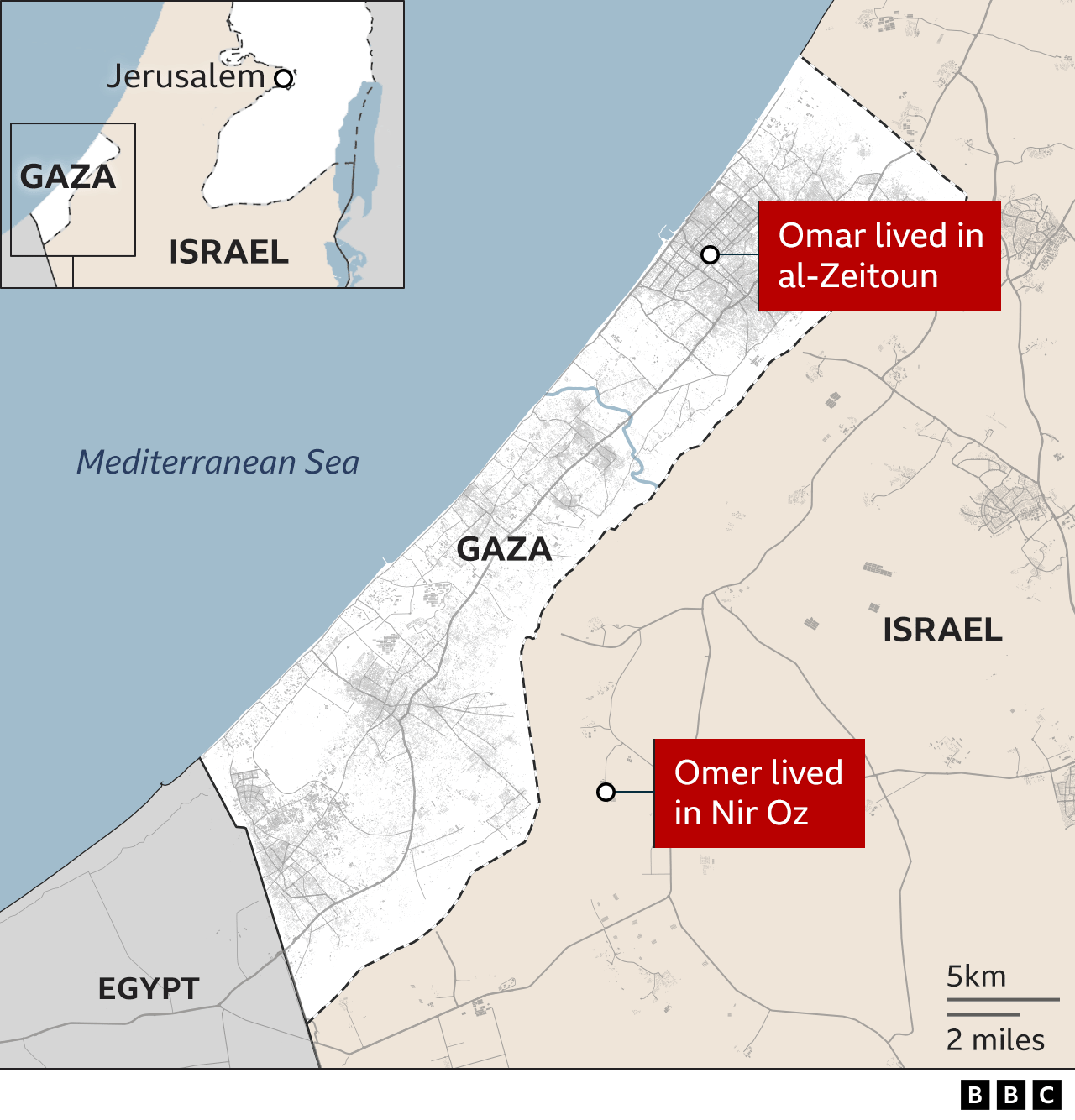
'It's not a real baby, it's a doll'
"The candle of my life" is how Omar Bilal al-Banna's mother Yasmeen describes her children on Instagram.
Two photographers put me in touch with her, and I matched up her profiles on social media with the details available to me to confirm her identity as Omar's mother.
Omar had been playing outside with his older brother Majd when he was killed. I've seen footage where Majd confirms this.
In the clip he describes how the strike hit their neighbour's house, and then rubble fell on Omar. Majd was wounded too. In the footage, his leg is bandaged and he looks shocked.
The first online post I saw about Omar's death was from a pro-Israeli account on X (formerly known as Twitter). It included a video, featuring a man in a grey polo shirt holding a small child's body, wrapped in a white blanket or cloth. I would later discover this child was Omar.
In the accompanying caption, the person who shared the clip declared: "Hamas is desperate!" They added falsely that the group - classified as a terrorist organisation by Israel, the UK and other powers - had "released a video showing a dead Palestinian baby. But wait for the catch. It's not a real baby; it's a doll".
This user said it "exposes how hard the lying and slanderous propaganda arm of Hamas and the Palestinians works". They suggested Hamas accounts had shared and then deleted the video because it wasn't real.
According to X, that post containing the video and false claims has been seen 3.8 million times. The allegations it made were then amplified by the State of Israel's official account on X.
It shared a new post, this time featuring that same video of the child in the white blanket - and then a still from the same video, circling the child's face.
In the caption, the account wrote: "Hamas accidentally posted a video of a doll (yes a doll) suggesting that it was a part of casualties caused by an IDF [Israel Defense Forces] attack."
In the hours that followed, other official accounts on X - including profiles belonging to Israel's embassies in France and Austria - repeated the claims. Before long, they were being spread by pro-Israel and anti-Hamas accounts based in Israel, as well as several that seemed to be based in India.
Each time, the posts would say the child was a doll. I have watched the extended footage, and it's clear from the video that this is a real person.
I tracked the original footage back to the Instagram page of a Palestinian photographer, Moamen El Halabi. He filmed the original video of the man in the grey shirt holding Omar, and I got in touch with him.
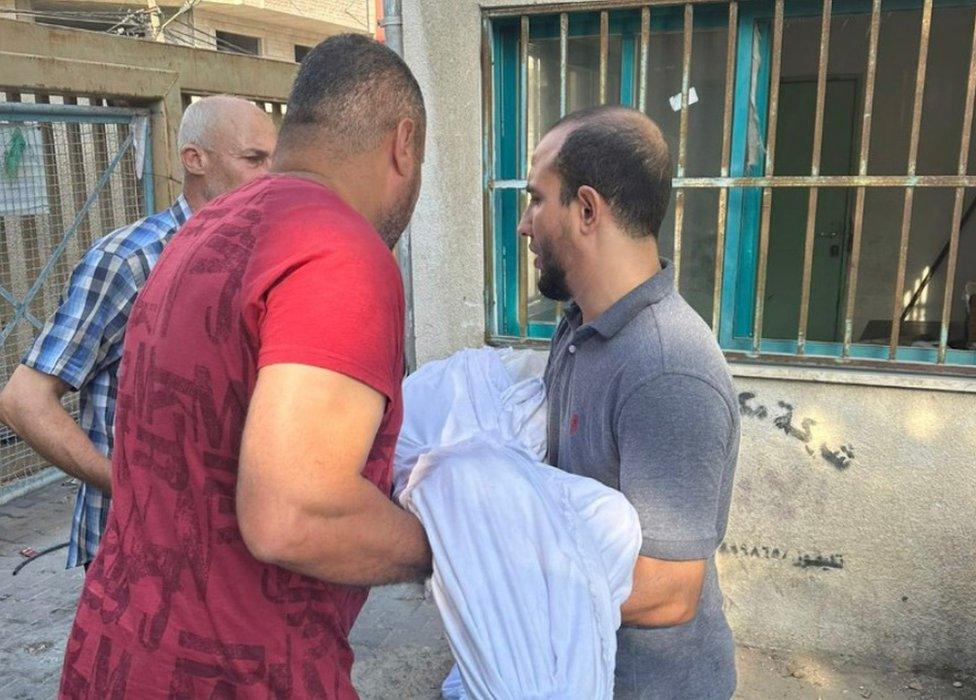
Moamen El Halabi's photo of Omar's body being carried away
I also made contact with another photojournalist, Mohammed Abed - who works for the AFP news agency - who was there at the same time. He took a photograph of the same man holding what appears to be the same child, wrapped in the white sheet. That photo has since been uploaded to the Getty Images website.
The caption accompanying the photo describes the scene "outside the morgue of Al-Shifa Hospital in Gaza City". It is dated 12 October 2023 - the same day the video clip was shared on Instagram by Moamen El Halabi.
Other fact-checking organisations like Alt News have also tracked down the source of the original photos and videos.
Both photojournalists provided me with further details to corroborate that the video and the photo had been taken at Al-Shifa hospital, outside the mortuary. The details included information about the situation at the hospital that day, and the man in the grey shirt, who was a relative of Omar's.
They both told me, categorically, that the child pictured had not been a doll, but a real little boy - Omar Bilal al-Banna. They also shared additional images, which I have matched up with Moamen El Halabi's original video footage to verify the child's identity.
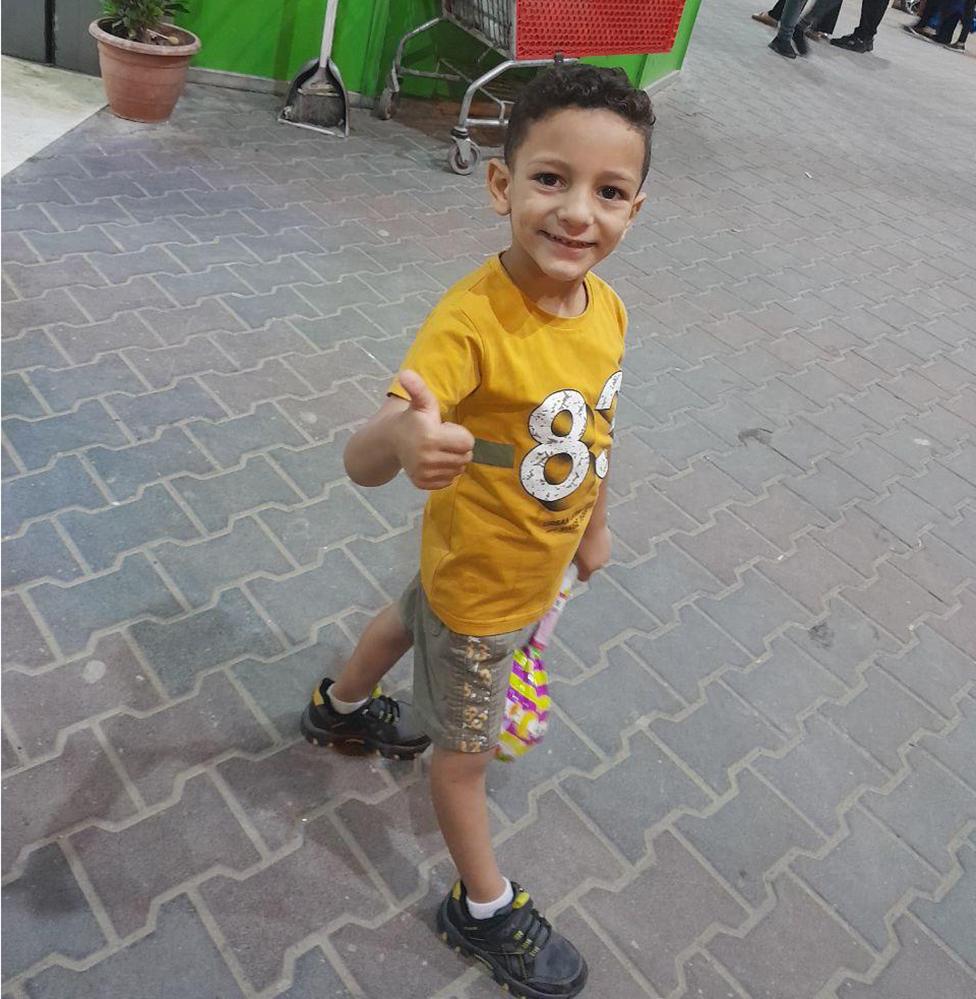
Omar Bilal al-Banna, in a picture shared by his family
Since we spoke, Mohammed Abed has posted an Instagram story with the photo he took. He declares in the caption: "This picture [is] not a doll, its [one] I took at Al-Shifa hospital and it's the very truth."
It seems that part of what made people think what they saw was a doll, rather than a child, was the colour of Omar's skin in the photograph. But Mr Abed said he had photographed several children killed in strikes in Gaza and their skin looked similar.
Omar's mother Yasmeen confirmed that her son had been killed by an air strike, adding that lies about the "killing of children and innocent people are untrue and fake".
"They have no right to say he is a doll," she said.
"They [the Israeli government] are lying and evading their crimes and massacres," she added.
A spokesperson for the Israeli embassy in the UK did not comment directly on these social media posts or on the circumstances of Omar's death. They told the BBC that "it is very important to review instances of disinformation" but also accused the BBC of spreading misinformation.
X did not reply to the BBC's request for comment.
'Omer was a paid actor'
"Omer was just an angel. He was so, so, beautiful and cute and pure. He was very close to his sisters. They were always playing together and they were so kind to him," Mor Lacob, a friend of the Siman-Tov family, told me.
She messaged them on WhatsApp on the sunny Saturday morning when Hamas gunmen broke through the Gaza perimeter fence and attacked their kibbutz. She told me they confirmed to her that they had managed to get into their shelter, but that was the last she heard.
Further messages sent to her friends were left unread.
Mor Lacob later found out that Omer's parents, Tamar and Yonatan, had been shot dead. Their three children - Omer plus his older sisters Shachar and Arbel - were killed when their home was set on fire. Their deaths have been covered by major news outlets.
In a photo, Omer is smiling - surrounded by his parents and sisters.
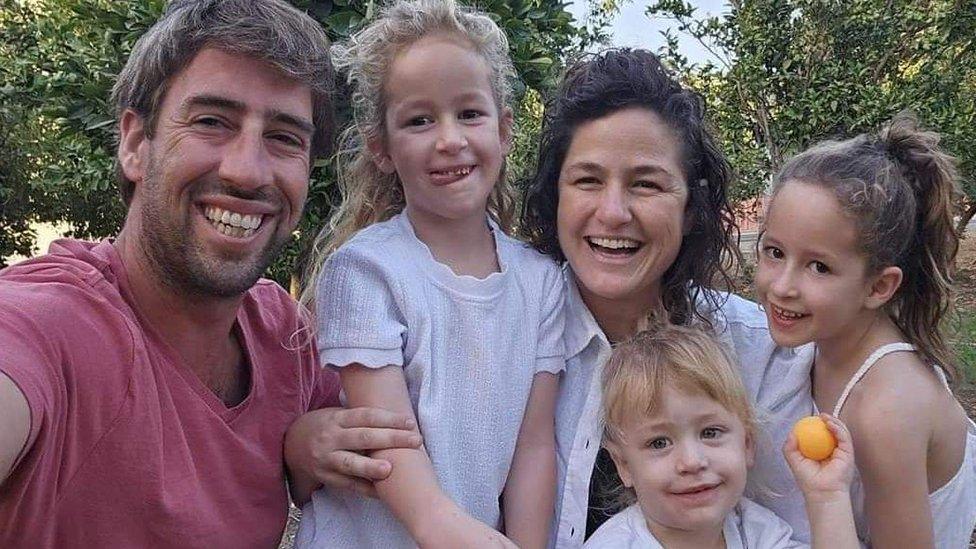
The Siman-Tov family: Yonatan and Tamar, with their daughters Shachar and Arbe, and their son Omer
The image was shared by the Israeli government's account on X, the post describing them as "an entire family wiped out by Hamas terrorists. There are no words. May their memory be a blessing". It was also shared by the former Israeli prime minister, Naftali Bennett.
But when I read the comments below - while there were many speaking of the terrible shock and offering support - there were others I had not expected to find.
Several accounts that supported Hamas claimed that Omer had been a "paid actor" because Hamas "didn't kill kids". Others said this was "Jewish propaganda at its finest", declaring that neither Omer, nor his sisters, had been killed. One wrote "there's no evidence" they were dead and asked to "stop the lying".
Scrolling through several other posts and videos showing the Siman-Tov family on different social media sites, I encountered dozens and dozens of similar comments.
Some suggested that he and his sisters had been "crisis actors" - people paid to act out a tragedy.

More on Israel-Gaza war
Follow live: Latest updates
Explained: What is happening in Israel and Gaza, and why now?
History behind the story: The Israel-Palestinian conflict

I checked out the profiles behind the comments. Many of them appeared to be real people based around the world. Several actively supported Hamas, and a couple appeared to be based in the occupied West Bank.
These were not accounts with huge followings. However, the cumulative effect of their posts seemed to bolster wider, viral social media narratives trying to suggest that Hamas had not killed or attacked any children, in spite of the widespread evidence of such violence.
Other untrue comments I spotted suggested that the murders had been real, but that Hamas gunmen had not been responsible. One user wrote, "I guess it's Israel themselves" who killed these children and the Israelis were "trying to blame Hamas".
Speaking to me from her home in Sydney, Australia, Mor Lacob said the comments on social media had caused her extra distress at a time when she was grieving her friends.
"I just want the world to remember and to know what happened. To deal with their death is hard enough, and all these comments make it even worse.
"How can I respond to that? I need to prove they died? Why did five graves need to be filled with their beautiful bodies?"
She described this kind of online disinformation as "evil and cruel".
When I told her how Palestinian children too, like Omar, had had their deaths denied and questioned on social media as well, she became upset again.
"My heart goes out to every single innocent [person] who got murdered and killed because of Hamas's actions," she said. "It's not fair."



In-depth analysis from Frank Gardner looking at what started the war between Israel and Hamas.
